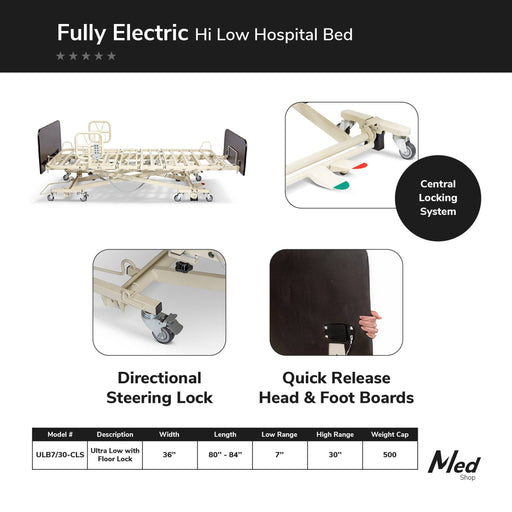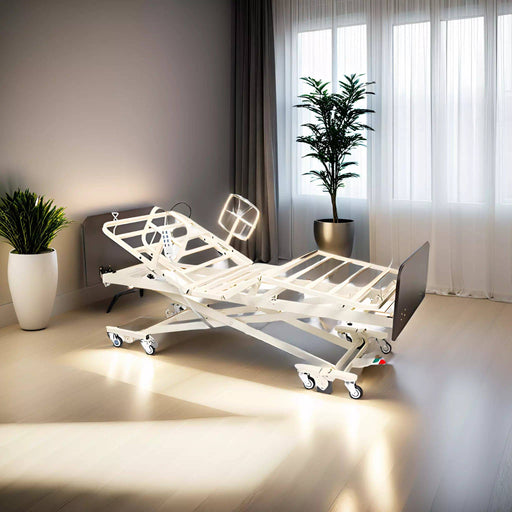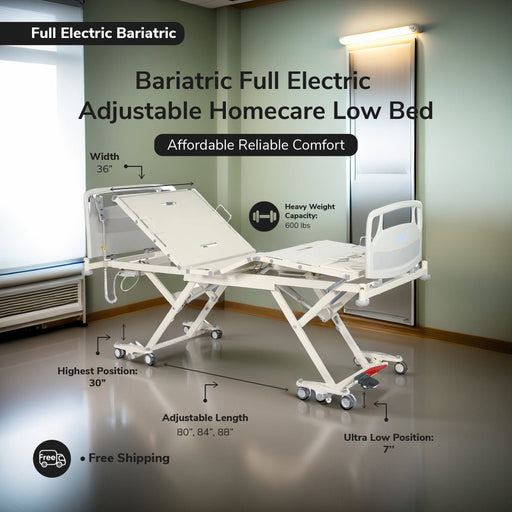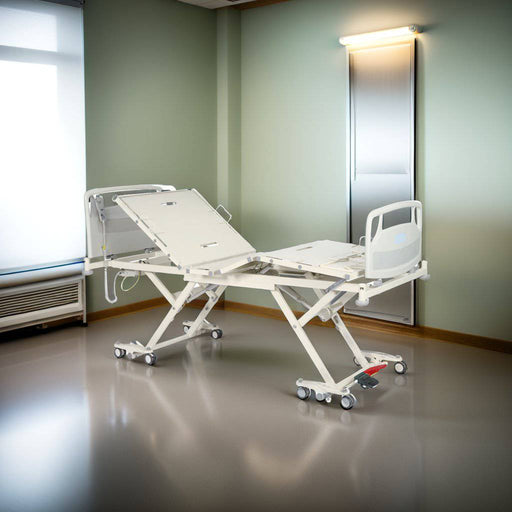
Will Medicare Pay for a Hospital Bed at Home? Understanding Coverage & Costs
Will Medicare pay for a hospital bed? This is one of the most common questions among those processing through the convoluted options that Medicare offers in relation to fundamental medical equipment such as a hospital bed for home care. The answer is, Yes. Medicare will cover this.
However, there are certain conditions and criteria that need to be met. Knowing about these requirements can make it easier and ensure that you will receive the support that you deserve for safe home care.
Medicare Part B will cover the hospital bed, if deemed a durable medical equipment item and prescribed by a doctor. Of course, we pay for some of this because Medicare only covers 80% of most services. We may have more comprehensive coverage, however, depending upon our Medigap or Medicare Advantage plans.
Understanding these requirements is very important in order to avoid unexpected costs that may be associated with receiving the support we need. Getting to know the rules and regulations of Medicare will make us better prepared for the possible costs and enable us to have the proper documents that will help us acquire coverage for a hospital bed.
Overview of Medicare Coverage for Hospital Beds
Medicare includes coverage for home care hospital beds under Part B, which categorizes them as durable medical equipment (DME). For the bed to qualify, it must be medically necessary and prescribed by a healthcare provider. These days you can find a Doctor online to assess and prescribe it to you.
Once prescribed, Medicare Part B efficiently handles 80 percent of the costs, giving beneficiaries some financial relief. However, out-of-pocket expenses still exist for the remaining 20 percent unless supplemental coverage, such as a Medigap or Medicare Advantage plan, is in place. If you have an FSA/HSA fund, medshop can accept this form of payment to help you out.
To access this benefit of medicare, eligibility within Medicare is paramount. Beneficiaries aged 65 or older, or those receiving disability benefits for 24 months, typically engage in Medicare Part B. Meeting specific medical criteria, defined by Medicare, ensures the covered benefits. Additionally, selecting a Medicare-approved supplier is critical to confirm that claims receive proper consideration and processing.
In some instances, the associated doctor must detail how the medical bed directly aids the individual's health condition, whether for your or loved one or for your patients. Common scenarios include severe pain, difficulty breathing, or leg and foot swelling. Understanding these criteria and maintaining comprehensive documentation simplifies navigating Medicare's approval process, securing necessary equipment, and avoiding financial surprises.

Eligibility for Hospital Bed Coverage
Eligibility for hospital bed coverage hinges on meeting specific Medicare criteria. Understanding these conditions ensures proper coverage and minimizes unexpected expenses.
Medical Necessity
A hospital bed is deemed necessary when a physician documents its requirement for body positioning that mitigates pain or promotes alignment, among other health factors. Medicare Part B covers such equipment if it addresses issues not solvable by standard beds. Common conditions include severe pain or risks of respiratory infections, requiring documentation for verification.
Doctor's Prescription
For Medicare to cover the home care bed, a doctor's prescription detailing the medical necessity is mandatory. Such documentation must outline the patient's specific needs that cannot be met by a regular bed. Medical records, along with the physician's report, bolster the claim, making sure it aligns with Medicare's statutory requirements. Proper adherence to these guidelines ensures streamlined approval for coverage.
Costs Associated with Hospital Beds Under Medicare
Understanding the costs involved under Medicare is crucial when considering hospital beds for home use. While Medicare Part B offers coverage, out-of-pocket expenses can still occur. Finding affordable hospital beds is easy on our store.
Medicare Part B Costs
Medicare Part B covers 80% of the Medicare-approved amount for hospital beds, classified as durable medical equipment. Beneficiaries pay the remaining 20% after meeting their deductible, which is $226 in 2024. To reduce costs, beneficiaries should select suppliers who accept assignment as this ensures charges are limited to the approved amount. This consideration helps manage expenses effectively while ensuring adherence to Medicare guidelines.
Medigap and Supplement Plans
Medigap plans can help cover the 20% of costs not included in Medicare Part B, reducing out-of-pocket expenses for hospital beds. These plans also cover coinsurance costs that might arise during extended hospital stays. It's essential to evaluate different Medigap policies to choose the one aligning with our healthcare needs and minimizes financial liability. Beneficiaries should explore coverage options that complement Medicare to enhance financial protection.
Alternative Payment Options
When Medicare doesn't cover the full cost of a hospital bed, alternative payment options can help ease the financial burden. Exploring these options ensures necessary equipment remains accessible. You can also find in home care beds under $1000 that come with free shipping.
Medicaid and Other State Programs
Medicaid often steps in where Medicare coverage ends. Since Medicaid is a state-specific program influenced by federal guidelines, it's not consistent across states. Many states offer Medicaid State Plans and Home and Community Based Services (HCBS) Medicaid Waivers, aiding the elderly in avoiding nursing homes by covering durable medical equipment (DME) like home hospital beds. For coverage, a physician must deem the bed medically necessary. Check state-specific Medicaid policies to understand available support.
Non-Profits and Charities
Non-profits and charities provide valuable resources for those needing hospital beds. Organizations often offer assistance through donations or discounted equipment. Contact local branches to inquire about programs and eligibility requirements. Such resources can fill gaps left by traditional insurance, ensuring access to vital medical equipment without imposing significant financial strain. Look for reputable organizations with a track record of supporting healthcare needs.
Considerations for Hospital Bed Features and Accessories
Our consideration of hospital bed features and accessories helps us understand coverage under Medicare. The specific features and optional accessories can influence whether Medicare covers the cost.
Features That May Affect Coverage
Certain features of hospital beds can impact Medicare coverage. Adjustable beds, for instance, must have functionality like raising the head or feet to qualify. Semielectric beds with adjustable positions also typically fall under Medicare's provisions. Beds with side rails for safety and extrawide bariatric beds capable of supporting high weights often meet coverage criteria. Understanding these requirements ensures alignment with Medicare's standard for a medically necessary hospital bed, providing essential relief for chronic conditions like heart ailments and spinal injuries.
Accessories Often Not Included
While hospital beds may include basic features, some accessories are usually not covered by Medicare. Items like specialized mattresses, footboards, and over-bed tables often require separate funding. Medicare typically views them as non-essential to the primary function of the hospital bed, thus they aren't part of the standard coverage. Considering alternative funding options for these accessories can help manage their acquisition without adding financial strain.
Conclusion
Navigating Medicare's coverage for hospital beds requires understanding the intricacies of eligibility and documentation. By ensuring that we have the necessary prescriptions and selecting approved suppliers, we can effectively manage our healthcare expenses. It's crucial to explore additional coverage options like Medigap to minimize out-of-pocket costs. For those who find Medicare coverage insufficient, exploring state programs and non-profits can provide valuable support. By being proactive and informed, we can secure the medical equipment we need without financial surprises.
Does Medicare cover hospital beds for home use?
Yes, Medicare Part B also involves any medically necessary hospital bed prescribed by a doctor. Medicare pays 80% of the charges, and the beneficiary pays the remaining 20%, unless additional coverage is in place. The patient needs to have a doctor's prescription and proper documentation to be covered.
What are the eligibility criteria for Medicare?
Medicare is available to anyone who has attained age 65 or who has been determined as having a disability for at least 24 months. To have claims processed, there must also exist a point that the beneficiary has satisfied any of the medical conditions decided by Medicare and the individual must select a Medicare-approved provider.
What costs are associated with hospital beds under Medicare?
Medicare Part B covers 80% of the approved amount for hospital beds. Beneficiaries are responsible for 20% after a deductible of $226 in 2024. Choosing suppliers who accept assignment helps manage expenses. Medigap plans can cover the 20% not covered by Medicare Part B.
Are accessories for hospital beds covered by Medicare?
While basic hospital bed features might be covered, accessories such as specialized mattresses, footboards, and over-bed tables typically are not. They may require separate funding. It's crucial to understand these coverage distinctions to manage healthcare expenses.
What happens if Medicare doesn’t fully cover the cost of a hospital bed?
If Medicare doesn’t cover the full cost, alternatives like Medicaid or state programs may offer assistance. Non-profits and charities also provide help, offering donations or discounted equipment to ensure that individuals can access necessary medical supplies without significant financial strain.
How is a hospital bed determined as medically necessary?
A hospital bed is deemed medically necessary if a physician documents its requirement for alleviating pain, promoting alignment, or addressing conditions standard beds cannot. A detailed prescription and proper documentation, including medical records, are crucial for aligning with Medicare requirements.









